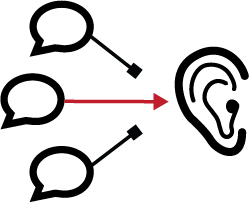A nurse informs me, "Your child has no problems with hearing," after coming back from the audiology testing.
I wonder, "Hmmm, why are some things not done as he is told?"
The nurse replies with a smile, "We don't test for 'Listening'."
A veteran Science teacher is lecturing to his seventh graders, "You would think you use your ears when you listen. But you must use your eyes when you listen."
Another Science teacher talks about the legendary tale to his eighth graders, "Each word has Kotodama (spirit of the language). If you want to understand what a speaker is saying, look at the person. The spirit comes in to you through your eyes. You will fully comprehend and appreciate the speech. On the other hand, when you put your head down, the Kotodama runs through above your head. The information will not stay in your brain.
The key words are Attentiveness and Purposeful.
Unlike several centuries before, there are so many different sounds nowadays in addition to natural sounds like bird chirping and wind blowing. In the big cities, sounds are more like uncomfortable "noises". Fortunately, we have a brain that has the ability to filter out unimportant sounds while finding the most critical perceptual signals according to the book How We Learn. And being able to select the sound, which is the most important and appropriate for that scene, leads to successful learners.
Train your brain by selecting the most important sound you must intake at a moment so you can be an attentive listener. To do that, you must be aware of your presence. What sounds do I notice? Which sound is the most important one that I have to focus on? Practicing mindfulness will help to discriminate different sounds.
In my music training, my teacher asked me to dictate the chord progression by focusing on one note each time. For instance, first, I listen to the top note of the three notes. Write down. Next, I focus on the bottom notes only. Write down. Last, the middle notes which are the hardest to discriminate in the chord. This training tremendously helped my "purposeful" listening skills beyond the solfege music ear training.
Gently guide young children to become purposeful listeners. They will start using all of their senses when they listen. That is our job.

No comments:
Post a Comment